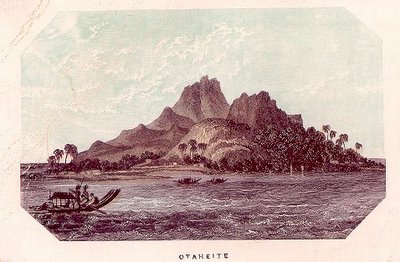At the end of it all, the most interesting thing that emerges is the extent to which the mutineers (but not just the mutineers) were affected by their five-month stay in Tahiti (Otaheite as they called it), picking Breadfruit prior to the voyage home. Allegedly (and on this, as on much else, there's much dispute) as they sailed off from Bligh and his loyalists after the mutiny, they called out "Huzza for Otaheite!" This has been disputed by those sympathetic to Fletcher Christian et. al., who wish to suggest that their motive was not to return to the easy life (and easy sex) of the South Pacific, but to rid themselves of Bligh's tyrannical authoritarianism. But why should the two be mutually exclusive?
Or even, why not revolt for something better, rather than merely against something worse?

Moreover, and pace Alexander's refrain as to how much the Europeans tainted and finally destroyed the Pacific paradise (introducing sexually transmitted diseases, but also the general strife and possessive individualism of Western ways), what's really remarkable is the extent to which the Europeans were themselves affected or even infected by Tahitian custom and culture.
It seems that the Bounty's crew would frequently converse in the Tahitian language, and indeed one of the (convicted, but pardoned) mutineers, Peter Heywood, spent most of his time awaiting what he thought would be execution writing up a dictionary of the language. Another mutineer, James Morrison, devoted "nearly half" of the 382-page book that was his account of the voyage and defence of his actions to "Tahitian culture and customs, geography and natural history. [. . .] The work is an extraordinary and valuable document of Tahitian life as it had been before the coming of the Europeans, and would never be again" (335).
Well, yes, Tahiti was irrevocably altered; but so were these Europeans, and perhaps also Europe as a whole. Alexander's main argument (in so far as she has one, in the morass of description) is that the Bounty story struck home so because it occurred at the cusp of Romanticism, and Christian stood as "the perfect Romantic hero" at "the dawn of this new era, which saw devotion to a code of duty and established authority as less honourable than the celebration of individual passions and liberty" (344, 345).
From this perspective, the Bounty story revolves less around the power relations between master and crew, though that is how it has been read, in terms of whether or not Bligh deserved to be overthrown; rather, it's more about the possibility of "going native," a possibility that carries with it the germ of what will become Romanticism.
No comments:
Post a Comment